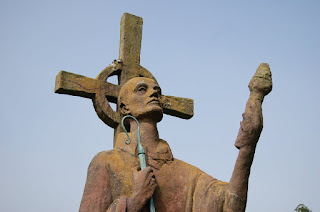One thing has shocked me as I have trawled the internet and watched videos is the bitterness of American political life. I watched today a debate on CNN concerned with a Baptist Pastor's sermon, in which he says he hates Obama and all he stands for and that he hopes he lands in Hell. I was stunned as I viewed such un-Christian rhetoric. Obama seems to be facing a torrent of venom unheard of in Europe.
I think the reason for this is quite simple. In England no Christian I know sincerely believes that his party is the party of God. A Christian voter here has a simple choice; which party will do the least damage to cause of Christ? It is a matter of the least of three evils. This is the same I believe all over Europe.
In America many Christians, perhaps the majority, believe that to be a Christian is to be a republican. Even the least of social reforms put forward by the Democrats is labelled as rank socialism or communism. Take the state of American health-care. American spends up 17% of it GDP on health issues. This is way above the proportion spent on health in the major industrialised countries, and there is no doubt that the best in
America is the envy of the rest of the world. Yet the picture is very patchy. For all the enormous amounts spent the results are not impressive. The average expectation of life is below that of many other developed nations and the level infant mortality, which is the true index of a nation's health, is the highest among industrialised nations, higher than that of poverty-stricken Cuba. The reason for this is simple; many tens of millions of Americans have no health insurance and cannot access the best of modern treatments. This what Obama is trying to redress, rather unsuccessfully it seems.
Another reason for the hatred felt towards Obama is his laissez-faire attitude towards abortion. He has done nothing to ban it. OK this is a serious moral problem. But when compared to his predecessor, George W Bush, his sins and misdemeanours, pale somewhat. He has not led his country, and the UK, into a disastrous war against Iraq, where even by conservative estimates, at least a 100, 000 Iraqis have died, as well as thousands of allied soldiers. Also the invasion has had a disastrous effect on the Iraqi Christian population. Before the war there were about 1.5 million in Iraq. That figure has now dropped to about 400.000. Most have fled to Syria, having lost their homes and most of their possessions. The secular despotism of Saddam, one that tolerated Christianity, has been supplanted by an intolerant form of Islam that believes that all Christians are allied to the invader.
















